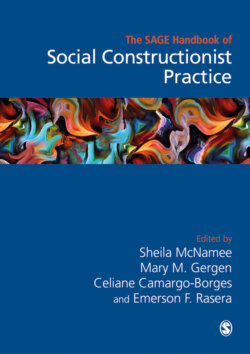Читать книгу The Sage Handbook of Social Constructionist Practice - Группа авторов - Страница 60
На сайте Литреса книга снята с продажи.
Co-Constructing the Research Agenda and Research Process
ОглавлениеThe first principle is co-constructing the research agenda and the research process by preparing the relational context (McNamee, 2009). Central for this is collaboration. At the core of these collaborative relationships are people's competence and capability to listen, take each other seriously, and respect the perspectives of others concerning both the relationship and the partnership in which they are involved (Strong et al., 2011). Making collaboration useful, Collaborative Action Research requires a free flow of information and the sharing of feedback among all parties so that they are on track with the changing intentions that often arise (Sundet, 2011). In the research literature which focuses on services and practices that keep the participants at the center of decision making, a number of essential principles are espoused. These include working with sometimes competing beliefs, values and priorities; power and power balancing; engagement strategies; consistency of care delivery; relationship competencies; role blurring; and negotiated decision-making (Ness et al., 2014; Strong et al., 2011).
In concrete terms, this principle involves getting to know each other as co-participants in the research, both personally and professionally, and getting to know people's interests, dreams and agendas – what do we all want to be achieved by doing this research project together. This involves what McNamee (2015) calls relational ethics, which means being attentive to the process of relating; this involves co-constructing trust in both persons and the research process.
When working with social change and social justice, one also needs to co-construct knowledge about the living conditions where co-researchers live their everyday lives. This means mapping and exploring the contextual and cultural knowledge about the everyday life of the community together with the co-researchers.
Another important topic is negotiating power relations. This means working in ways that enable the research to be truly collaborative. This requires the authentic engagement of all the co-researchers in equally voicing and influencing shared decision making, which involves listening to multiple views and together finding ways to make the decision-making process transparent and collaborative, not something that those with the most power (i.e., researchers) own (Heron, 1996).
Based on these above-mentioned topics, after becoming familiar with the people (i.e., their backgrounds, living conditions, interests, social context) and negotiating the power relations that affect the process of collaboration, the next principle is then to negotiate shared purposes and research questions and prepare the research process. This also involves the need to take into account in the conversation what the participants would like to use as data for the process of co-constructing the knowledge that may be disseminated.
Another point is related to research ethics. It is important to consider the ways of conceptualizing ethical issues in terms of an approach that Banks et al. (2013) call ‘everyday ethics’, which emphasizes the situated nature of ethics, with a focus on the qualities of character and the responsibilities attached to particular relationships (as opposed to the articulation and implementation of abstract principles and rules). Everyday ethics is the daily practice of negotiating the ethical issues and challenges that arise through the life of CAR projects. Thus, the ‘ethical’ is present in ways of being and acting as well as in relationships, emotions and conduct. The key qualities of a researcher include ethical sensitivity (the capacity to see the ethically salient features of situations) and relational virtues, such as trustworthiness (reliability and not disappointing others) (Banks et al., 2013). This is similar to what McNamee and Gergen (1999) call ‘relational responsibility’ and ‘relational ethics’ and what Swim et al. (2001) call ‘process ethics’.
